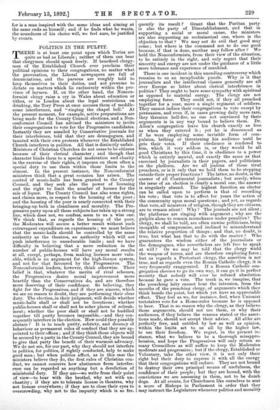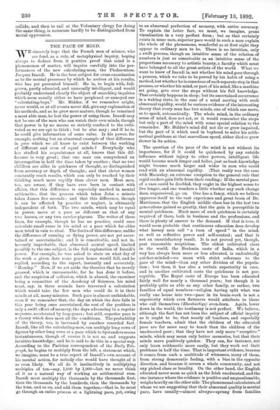POLITICS IN THE PULPIT.
THERE is at least one point upon which Tories are quite as bad as Liberals ; neither of them can bear that clergymen should speak freely. If beneficed clergy- men of the Established Church ever proclaim their political opinions to their congregations, no matter -what the provocation, the Liberal newspapers are full of denunciations, and the parsons are roughly told to keep themselves to their duties, and not presume to dictate on matters which lie exclusively within the pro- vince of laymen. If, on the other hand, the Noncon- formist clergy raise a cry in Wales about education or tithes, or in London about the legal restrictions on drinking, the Tory Press at once accuses them of meddle- some interference, and " ringing the chapel bell." At the present moment, for example, active preparations are being made for the County Council elections, and a Non- conformist Council has advised the ministers to invite their congregations to vote for the Progressive candidates. Instantly they are assailed by Conservative journals for their interference, told that they are demagogues, and taunted with their own protests whenever the Established Church interferes in politics. All that is distinctly unfair. Ministers of Christian Churches do not cease to be citizens because of their clerical character ; and though that character binds them to a special moderation and charity in the exercise of their rights, it imposes on them often a special duty to use them within those limits to the utmost. In the present instance, the Nonconformist ministers think that a great occasion has arisen. The control Of music-halls has been granted to the County Council, and they seek also the power of licensing and the right to limit the number of houses for the sale of liquor. The County Council has also some rights, and claims more, in respect to the housing of the poor ; and the housing of the poor is nearly connected with their bringing-up both in cleanliness and morality. The Pro- gressive party upon all these subjects has taken up a strong line, which does not, we confess, seem to us a wise one. We think that, as regards the housing of the poor, the Moderates will secure a better result without such extravagant expenditure on experiments ; we must believe that the music-halls should be controlled by the same authority as the theatres, an authority which will not push interference to unendurable limits • and we have difficulty in believing that a mere reduction in the number of public-houses will have any moral results at all, except, perhaps, from making licences more valu- able, which is an argument for the high-licence system, and not for that favoured by the Progressives. The Nonconformist leaders, however, think otherwise. Their belief is that, whatever the merits of rival schemes, the Progressives desire moral improvement more heartily than the Conservatives do, and are therefore more deserving of their confidence. So believing, they fight for the Progressives, and if they are sincere, which we see no reason to doubt, they are performing their clear duty. The election, in their judgment, will decide whether music-halls shall or shall not be licentious ' • whether public-houses shall or shall not be sober places of refresh- ment; whether the poor shall or shall not be huddled together till purity becomes impossible,—and they con- sequently interfere in the election. How could they possibly abstain ? It is to teach purity, sobriety, and decency of behaviour as permanent rules of conduct that they are ap- pointed to their offices ; and if they think those objects will be secured by a party in the County Council, they are bound to give that party the benefit of their warmest advocacy. We do not see, for our part, why they should not interfere in politics, for politics, if rightly conducted, help to make good men • but when politics affect, as in this case the ministers believe they do, the first rules of Christian con- duct, we cannot conceive how abstinence from interfer- ence can be regarded as anything but a dereliction of ministerial duty. If they are—we write from their point of view—to bear with the brothel, why not with un- chastity ; if they are to tolerate license in theatres, why not license everywhere ; if they are to close their eyes to overcrowding, why not to the impurity which is so fre- quently its result ? Grant that the Puritan party is also the party of Disestablishment, and that in supporting a social or moral cause, the ministers are also supporting an ecclesiastical one, where is the objection to that We may not do evil that good may come ; but where is the command not to do one good because, if that is done, another may follow after ? We hold the Nonconformists, from their view of the situation,. to be entirely in the right, and only regret that their sincerity and energy are not under the guidance of a little more tolerance and experience of mankind.
There is one incident in this unending controversy which remains to us an inexplicable puzzle. Why is it that journalists and the intellectual classes generally are all over Europe so bitter about clerical interference in politics ? They ought to have some sympathy with spiritual as opposed to material energy. The clergy are not employing force. They could not, if they all preached together for a year, move a single regiment of soldiers. They cannot induce their congregations to vote except by persuasion, and even if, in cases growing daily more rare, they threaten hell-fire, no one not convinced by their arguments is in any way bound to believe them. Dr. Allon's congregation leave his church exactly as free as when they entered it ; yet he is denounced as if he were employing some invisible form of com- pulsion, bribing or threatening his audience until he gets their votes. If their obedience is rendered to him, which it very seldom is, or they would be all good Christians by this time, it is obedience to a power which is entirely mental, and exactly the same as that exercised by journalists in their papers, and politicians on the platform. Are we all jealous of these rival preachers, or is it only that we hold them to be stepping outside their proper functions ? The latter, no doubt, is the answer of all Continental journalists ; but surely, when the issue of an election is clearly a moral one, the answer is singularly absurd. The highest function an elector can be called upon to perform is that of recording his vote ; that vote is to affect for years the action of the community upon moral questions ; and yet, as regards that vote, all ministers of religion, though they are citizens, are to remain silent ! Why ? The journals are not silent ; the platforms are ringing with argument ; why are the pulpits alone to remain mumchance under penalties ? The clergy, we shall be told, are often unwise politicians, being incapable of compromise, and inclined to misunderstand the relative proportion of things ; and that, no doubt, is true, but what has that to do with the matter ? Who guarantees the wisdom either of the journalists or the demagogues, who nevertheless are left free to speak at will ? Or we may be told that the clergy wield the weapon of terror, and are therefore employing force ; but as regards a Protestant clergy, the assertion is not true, and as regards even the Roman Catholic clergy, it is very frequently exaggerated. If a Roman Catholic con- gregation chooses to go its own way, it can go it in perfect security that nobody will ever be refused absolution because he gave a vote. The truth is, we imagine, that the preaching laity cannot bear the intrusion, from the mouths of the preaching clergy, of arguments which they think beside the point, but which yet have an appreciable effect. They feel as we, for instance, feel, when Unionist teetotalers vote for a Home-ruler because he is opposed to beer. That is no reason why the clergy, as they believe those arguments, should not use them, or why their audiences, if they believe the reasons stated or the asser- tions made, should not accept their advice. All alike are perfectly free, and entitled by law as well as opinion, within the limits set to us all by the higher law, to use their freedom. We regret, in the present in- stance, what we believe to be a thorough misappre- hension, and hope the Progressives will only return so many Councillors as will suffice to keep the Moderates moderate and progressive ; but if the clergy, Established or Voluntary, take the other view, it is not only their right but their duty to express it with all the energy that their congregations will endure. They are not bound to destroy their own principal means of usefulness, the confidence of their people; but they are bound, with the convictions we are assuming in them, not to be dumb dogs. At all events, for Churchmen like ourselves to seat a score of Bishops in Parliament in order that they may instruct the Legislature whenever politics and morality collide, and then to rail at the Voluntary clergy for doing the same thing, is nonsense hardly to be distinguished from moral oppression.



































 Previous page
Previous page